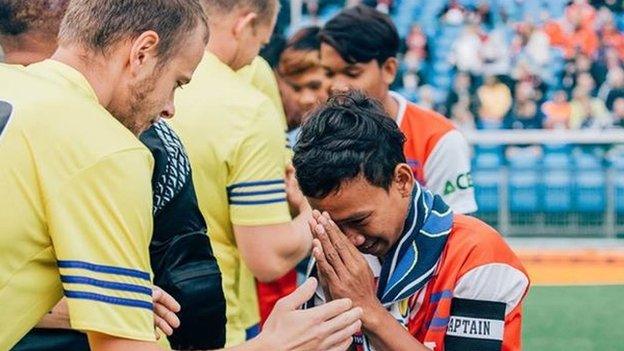Homeless World Cup in Cardiff: 'Football changed my life'
- Published
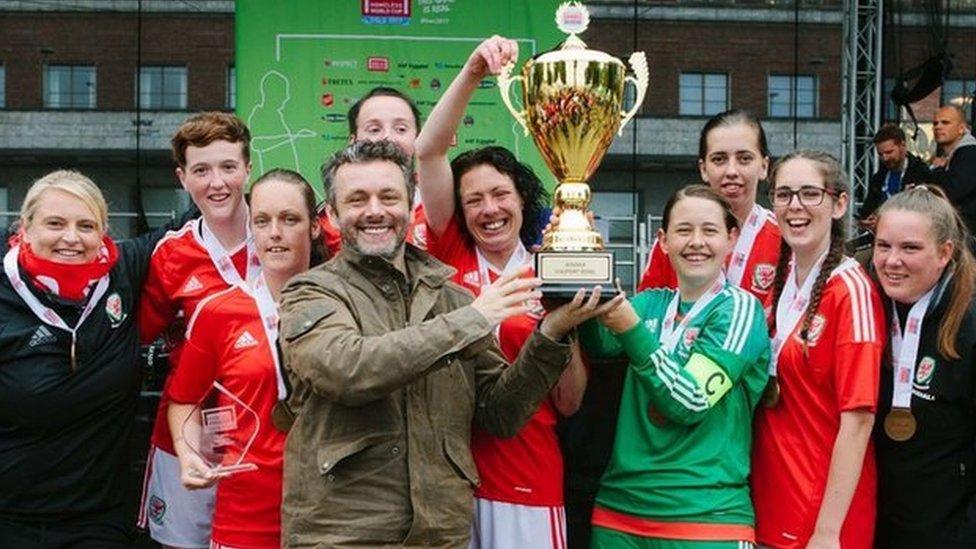
Michael Sheen helps the Wales women's team celebrate their tournament win in Oslo in 2017
"I couldn't be representing my country and not turning my life around at the same time," said former heroin addict Dee Sansome.
The 38-year-old, who has been in prison and ended up on the streets for four years, reckons being picked to play for Wales in the Homeless World Cup in 2017 transformed her life forever.
"It helped me start achieving and believing in myself," she said.
Cardiff hosts the competition, external in July with 500 players from 50 countries.
The successful bid was led by actor Michael Sheen who Dee, from Newport, now counts as one of her friends.
"If you'd told me when I was in prison that I'd be on TV talking about representing my country and being friends with Michael Sheen I would have said 'in your dreams'," she said.
"Scoring a goal felt absolutely amazing... it was immense, I just can't explain it… the feeling inside it just felt… yeah… I've done it, I've achieved it, I've scored a goal for my country, I've represented my country."
Dee Sansome: Football "helped me start achieving and believing in myself"
Organisers want to use the competition in Cardiff to create a "lasting legacy", external and create opportunities for people affected by homelessness.
Dee's life story wouldn't be out of place in the pages of a book.
Abused as a child, she was addicted to heroin at 19. Resorting to fraud to fund her habit, by 21 she was in prison.
When she was released from prison after serving a second sentence, she had nowhere to go.
Dee was homeless for four years, spending time sleeping rough on the streets of Newport or sofa surfing.
But things began to change when friends at a hostel encouraged her to join Street Football Wales.
The charity works with people who have experienced homelessness, addiction and exclusion, giving them a chance to build their confidence through training and playing the game.
"We were all making a pizza and they were all 'please Dee, we need a girl on the team' and I was 'no, no'. They said, 'just come and have a go'."
Dee had been drinking and was still using drugs when she went to the first training sessions. But that changed as her confidence grew.
"When I first started the football, the first tournament I ever went to I was half-cut, I was using.
"I came to the tournament, played the games and, over time, I started reducing everything."
And then she was picked to play for Wales in the Homeless World Cup.
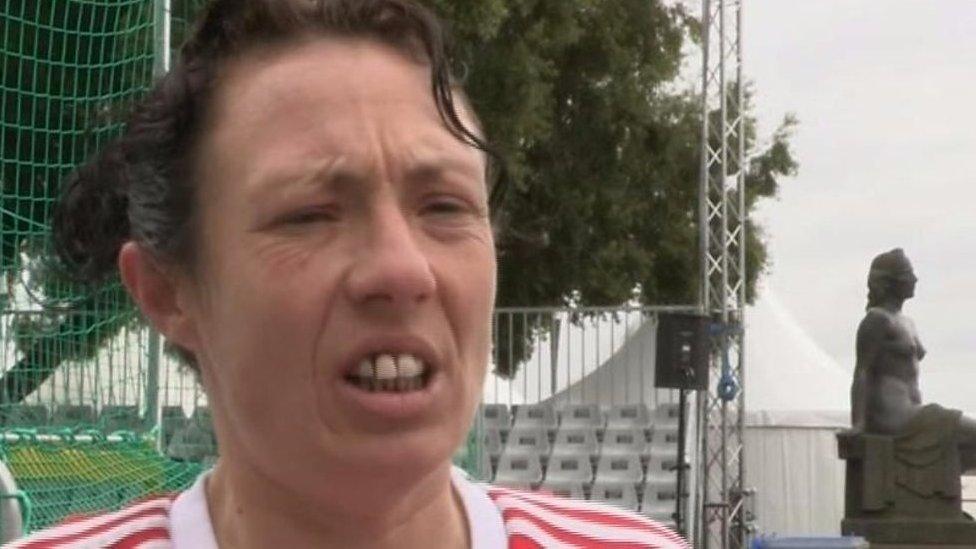
2017: Dee scored in her first world cup competition
"When I got scouted for Wales that was it for me, I felt like I had to make a difference.
"I couldn't be representing my country and not turning my life around at the same time.
"I couldn't go to Oslo and be that person representing Wales in the Homeless World Cup still using or being in a bad place.
"It helped me start achieving and believing in myself."
Dee's goal in Oslo was cheered on by Sheen.
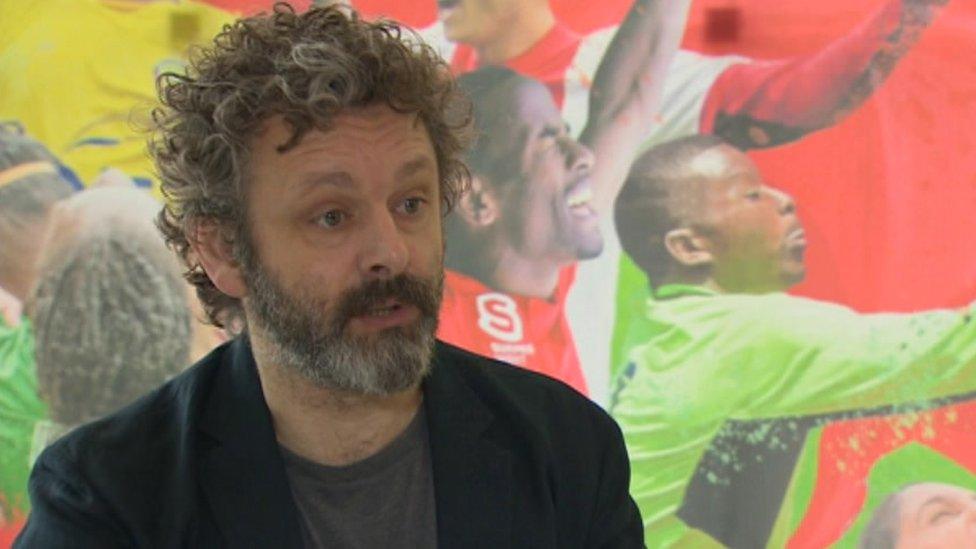
Michael Sheen: "You put the jersey on to represent your country and that changes you"
Sheen said: "Having spent some time with Dee, heard a bit about what she had been struggling with in the past, what she was struggling with at that very moment, and to see the effect of scoring a goal, the look on her face, the joy, the self-confidence, the motivation that brought was incredible.
"To watch someone who has travelled out of Wales for the first time in their life, put that jersey on… it doesn't matter if you're Gareth Bale or someone who's living in a tent on Queen Street, you put the jersey on to represent your country and that changes you."
Keri Harris founded Street Football Wales in 2003 and, 16 years on, 30 teams of men and women who've experienced homelessness are regularly playing football across Wales.
He has taken a Wales side to every Homeless World Cup and he said holding the competition in Cardiff was going "to be mind-blowing for everyone involved".
'Clean and sober'
"For us to have a tournament at home after 16 years of attending the tournament is going to be absolutely fantastic," he said.
"It's going to change perceptions of people coming and watching the tournament, it's going to be an amazing experience for everyone, playing in front of a home crowd [and] in front of a Welsh crowd is going to be insane."
Dee's life is now very different. She's clean and sober and she's moved into a flat of her own.
She's preparing to open an all-female car wash business in Newport, employing former offenders.
"When I was in prison, I wouldn't have even thought I would have been playing football. It's changed my life," she said.
- Published3 March 2019
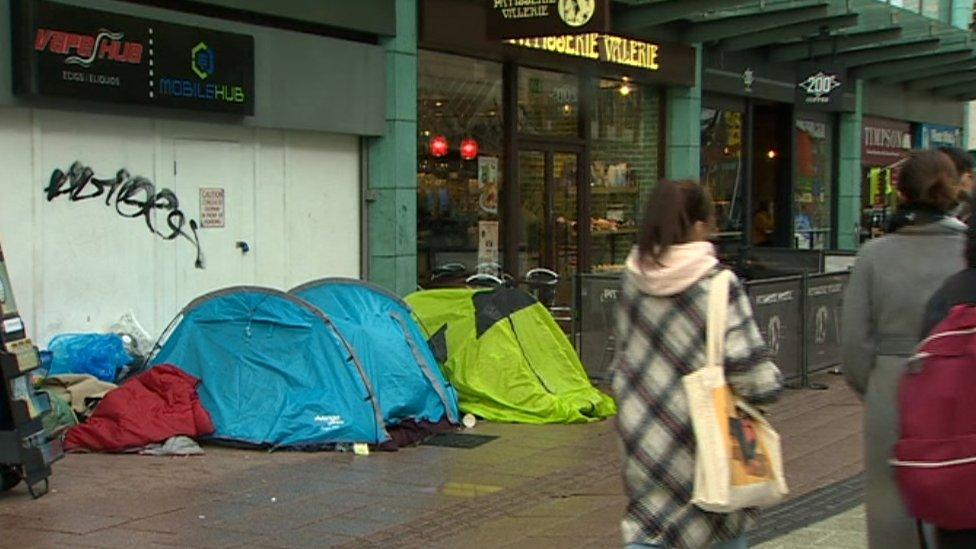
- Attribution
- Published7 September 2017
